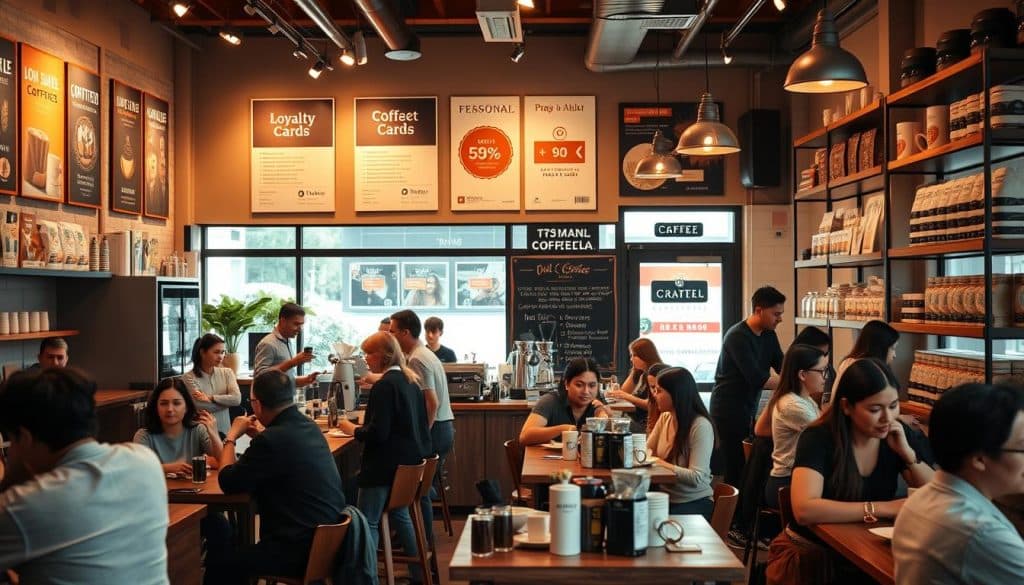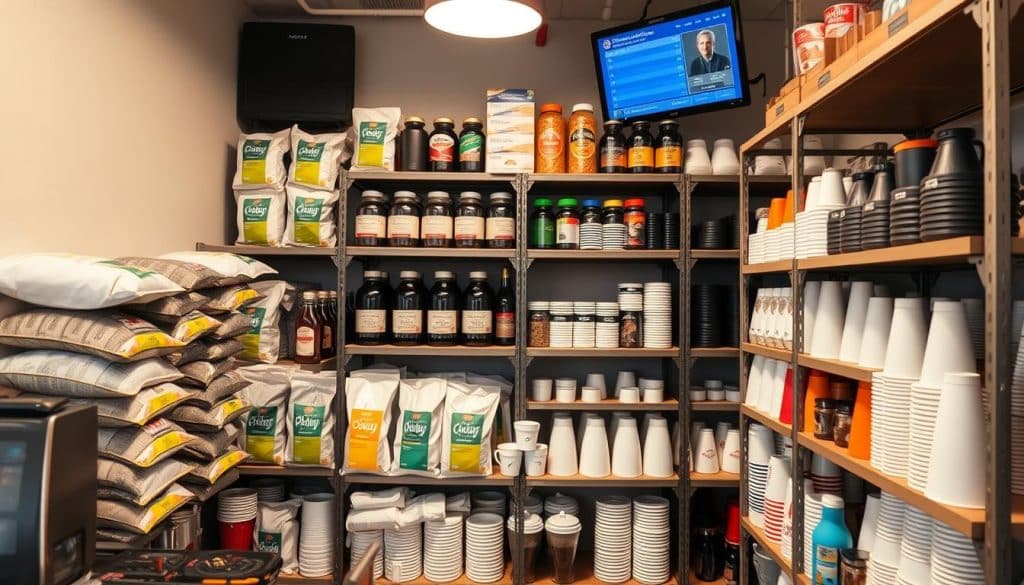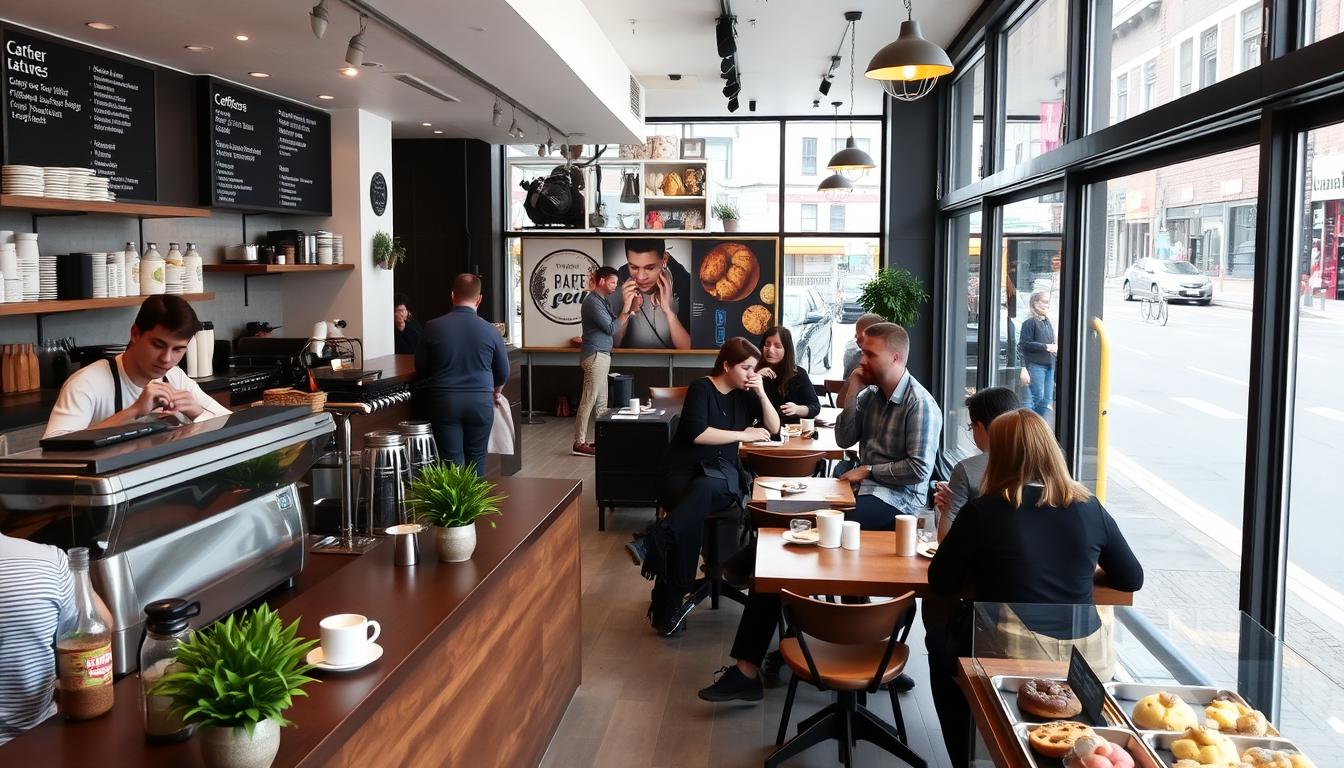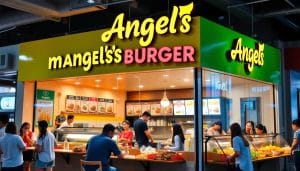Have you ever wondered why the coffee franchise industry keeps growing while others decline?
The coffee business is now a top choice for new entrepreneurs. With more people wanting high-quality coffee, coffee franchises are a smart choice. This article will look at the good sides of owning a coffee franchise and the success of certain models. Brands like Dunkin’ and Bad Ass Coffee of Hawaii show there’s a lot of chance for success in this field.
We’ll go into the details of succeeding in this area. This includes knowing the costs and how to market well. The goal is to give future investors the info they need to make smart choices. They’ll learn about the best franchises and hear from those who have made it big.
Key Takeaways
- The coffee franchise sector is booming, fueled by rising consumer demand.
- Brand recognition plays a critical role in a coffee franchise’s success.
- Investing in a well-known franchise can lead to higher profits.
- Marketing strategies are key to drawing in and keeping customers.
- Knowing the investment costs upfront can prevent financial surprises.
- Operational challenges can be managed with good training and support.
Introduction to Coffee Franchising
A coffee franchise lets entrepreneurs run their own coffee shop under a well-known brand. This model offers proven recipes, efficient systems, and marketing plans. It ensures quality, boosting success in the competitive coffee market.
The coffee business is always in demand, drawing new franchisees. Despite being crowded, there are chances for everyone. With coffee lovers always coming back, investors look for top franchises. Scooter’s Coffee, with nearly 800 locations, shows the growth possibilities.
Franchisees need at least $500,000 in net worth and $250,000 in liquid assets. This investment is key to entering the market.
Successful franchises focus on memorable experiences for customers. Coffee shops thrive on repeat customers, making loyalty essential. Brands like Bad Ass Coffee of Hawaii show this with their merchandise sales, which make up 15% of their revenue.
Such strategies build loyalty and make the coffee business appealing. They create strong connections within the community through unique offerings.
The Benefits of Owning a Coffee Franchise
Owning a coffee franchise lets you join the booming coffee market. Brands like Dunkin’ and Scooter’s Coffee have a loyal customer base. This means more visibility and credibility in your area.
This strong presence attracts new customers and keeps them coming back. It makes it easier to make money.
Established Brand Recognition
Franchisees with well-known brands get instant recognition from customers. Places like Charlotte and Raleigh are great for attracting coffee fans. North Carolina’s growing population means more customers for you.
Being part of a recognized brand builds trust with customers. This is key for success in a competitive market.
Comprehensive Training and Support
Franchise support is vital for running a coffee shop smoothly. You get training on everything from setting up to marketing. Scooter’s Coffee focuses on quality service.
They also offer ongoing support. This helps you keep your shop consistent and meet customer needs. It boosts your chances of success.
Popular Coffee Franchise Options
The coffee franchise world has a mix of well-known chains and specialty brands. Each offers unique chances for new business owners. Top coffee franchises are known for their strong brands, wide menus, and focus on community. Specialty brands, on the other hand, offer unique experiences that draw in customers who are looking for something different.
Major Chains to Consider
Big names like Starbucks and Dunkin’ lead the coffee franchise market. They provide a lot of support to their franchisees. Starbucks, with over 38,000 locations worldwide, is known for its quality and service. Dunkin’, with more than 13,200 locations, is a strong competitor.
Other big players include Caribou Coffee and Biggby Coffee. Caribou Coffee has over 300 locations in the Midwest. Biggby Coffee has grown to over 375 locations across the U.S. PJ’s Coffee and Tim Horton’s also offer great opportunities in their areas.
Specialty Coffee Brands
Specialty coffee brands like The Human Bean and Aroma Joe’s focus on quality and ethics. They build strong relationships with customers and use local ingredients. This appeals to those looking for unique coffee experiences.
Other specialty brands, like Scooter’s Coffee and Café 86, cater to specific tastes. They help the industry grow, expected to reach $14 billion by 2025 from $11 billion.
Understanding the Investment Costs
Investing in a coffee franchise requires knowing all the costs involved. It’s important to understand these costs well. This way, future owners can plan better and see if their investment will pay off.
Franchise Fees and Royalties
Franchise fees and royalties are big parts of the costs. Traditional franchises charge fees from $20,000 to hundreds of thousands. They also take a cut of your sales, usually 5% to 8%.
Hard Bean Coffee is different. It doesn’t charge upfront fees or take royalties. This makes it a great option for those who want to save money and make more profit.
Initial Setup and Equipment Costs
Setting up a coffee shop can cost a lot, from $200,000 to over $1 million. This includes building, decorating, and buying equipment. You need the right gear to make your shop welcoming and functional.
Future owners should also think about the money needed for daily expenses. This includes paying employees, buying supplies, and covering rent. Knowing these costs helps understand the financial commitment needed for success.
Key Factors in Choosing a Coffee Franchise
Choosing the right coffee franchise is a big decision. It involves looking at several key factors. First, the location strategy is critical for making money. You need to do market research to understand the area well.
This research helps you know who your customers are and where they are. Finding a good location is key, as it attracts the right customers. This is even more important in busy cities.
Location and Market Research
Doing deep market research is a must. It helps you see what customers like and how much they spend. Coffee shops do best in places where lots of people walk by.
The cost of the location matters too. It should match the money you expect to make. If a place costs a lot, it must bring in a lot of customers.
Franchise Reputation and Success Rate
Looking at a franchise’s reputation and success is also vital. Brands with a good track record make it easier to decide. They usually offer a lot of help and training.
This support helps you use your skills well. A franchise’s focus on quality and service can make it more successful. This leads to more money and a strong reputation over time.
Marketing Strategies for Coffee Franchises
Marketing is key for coffee franchises to stand out. They need to attract new customers, keep existing ones coming back, and boost sales. This is done through various marketing channels.
Leveraging Social Media
Social media is a big part of marketing for coffee franchises. Platforms like Instagram and Facebook are great for sharing promotions and customer stories. They help build a community around the brand.
By engaging with customers online, franchises can get more people to visit their stores. They can also collect contact info for future marketing efforts. This strengthens customer relationships.
In-Store Promotions and Events
In-store promotions are a great way to get more people in. Seasonal deals, loyalty programs, and events like tastings or themed nights are exciting. They make customers want to come back.
These efforts can increase foot traffic and sales. A lively store atmosphere attracts both regulars and new faces. It helps the brand stay top of mind.

Navigating Legal Considerations
Starting a coffee franchise requires knowing the legal aspects well. It’s key to review the Franchise Disclosure Document (FDD) first. This document gives important details about the franchise, like fees and what you must do. Knowing these legal requirements helps you make smart choices in coffee franchising.
Franchise Disclosure Document (FDD)
The FDD is a must-read for understanding the franchise agreement. It explains the franchise’s key points, like what you’ll do and what you can’t. States also have their own rules for franchises. You need to know these to avoid big fines and legal trouble.
Franchise Agreements and Obligations
The franchise agreement is a big deal. It talks about things like where you can operate and how long you can. Knowing your role in the agreement is important for success. It affects how you run your business every day.
It’s also important to know about laws on jobs, like minimum wage and fair treatment. This helps you avoid legal problems and keeps your business running smoothly.
For more on these legal matters, check out legal tips for franchise owners. Knowing these things helps you make better choices and grow your business.
Operational Challenges and Solutions
Running a coffee franchise comes with its own set of challenges. These include hiring and training staff, and managing inventory and supplies. Overcoming these hurdles is key to keeping operations smooth and customers happy. This is vital for the franchise’s long-term success.
Hiring and Training Staff
Finding the right staff is essential for maintaining high service quality. Labor costs can be up to 45% of a coffee shop’s budget. It’s important to strike the right balance in staffing.
Creating detailed training programs is vital. These programs should teach brand standards and customer service skills. Regular training keeps staff on track and helps them handle busy times.
Managing Inventory and Supplies
Good inventory management is critical to avoid waste and keep products available. Franchisees should use tracking systems to monitor stock levels in real-time. Technology can make ordering easier, improving the supply chain.
Keeping inventory in check helps meet customer needs and stay within budget. This boosts operational efficiency.

Inspiring Success Stories in Coffee Franchising
Looking at the paths of successful coffee franchisees offers insights for new entrepreneurs. Ziggi’s Coffee is a great example. It was started by Brandon and Camrin Knudsen in 2004. By 2016, it began franchising and now has 97 locations in 20 states, with more on the way.
The brand’s strong community ties and people-first culture are key. These elements help create a consistent experience. This makes Ziggi’s a great example for those looking into coffee franchises.
PJ’s Coffee of New Orleans also has a compelling story. It has over 180 locations in 14 states and was named a “Top Franchise for Veterans” in 2023. PJ’s Coffee offers veterans a big discount on franchise fees and supports them through initiatives like the annual Veteran Franchise License Giveaway.
These efforts show the importance of community involvement and supporting different entrepreneurial dreams. Industry experts say a clear purpose and quality focus are vital for success. Ziggi’s and PJ’s Coffee show that focusing on people and quality can lead to significant growth.
New franchisees can learn a lot from these brands. Adopting similar strategies will help them face the coffee franchise world’s challenges.
FAQ
What are the benefits of investing in a coffee franchise?
How much does it typically cost to open a coffee franchise?
FAQ
What are the benefits of investing in a coffee franchise?
Investing in a coffee franchise gives you access to a well-known brand. It also comes with a loyal customer base, training, and ongoing support. This makes it more likely to be profitable.
How much does it typically cost to open a coffee franchise?
The cost to open a coffee franchise varies. Initial fees can be from ,000 to hundreds of thousands of dollars. Setup and equipment costs range from 0,000 to over
FAQ
What are the benefits of investing in a coffee franchise?
Investing in a coffee franchise gives you access to a well-known brand. It also comes with a loyal customer base, training, and ongoing support. This makes it more likely to be profitable.
How much does it typically cost to open a coffee franchise?
The cost to open a coffee franchise varies. Initial fees can be from $20,000 to hundreds of thousands of dollars. Setup and equipment costs range from $200,000 to over $1 million, depending on the brand and location.
What are some popular coffee franchise brands to consider?
Popular coffee franchises include Dunkin’, Starbucks, The Human Bean, and Scooter’s Coffee. Each offers a unique business model, flavors, and customer experience.
How important is location in choosing a coffee franchise?
Choosing the right location is key to success. Doing thorough market research is important. This includes looking at demographics and competition to boost sales and profits.
What marketing strategies work best for coffee franchises?
Good marketing for coffee franchises includes using social media. It helps build community engagement. In-store promotions and events also help keep customers coming back and increase foot traffic.
What should I know about franchise agreements before investing?
Franchise agreements outline the terms of the relationship. This includes territorial rights, duration, and exit strategies. It’s important for investors to understand these terms to protect their investment.
How can franchisees manage operational challenges?
Franchisees can tackle operational challenges by hiring well-trained staff. They should also use efficient inventory management and ongoing training. This helps keep service and product quality high.
Are there affordable coffee franchise options available?
Yes, there are affordable coffee franchise options. Different brands offer various entry costs and support. This makes it easier for aspiring entrepreneurs to find a franchise that fits their budget.
million, depending on the brand and location.
What are some popular coffee franchise brands to consider?
Popular coffee franchises include Dunkin’, Starbucks, The Human Bean, and Scooter’s Coffee. Each offers a unique business model, flavors, and customer experience.
How important is location in choosing a coffee franchise?
Choosing the right location is key to success. Doing thorough market research is important. This includes looking at demographics and competition to boost sales and profits.
What marketing strategies work best for coffee franchises?
Good marketing for coffee franchises includes using social media. It helps build community engagement. In-store promotions and events also help keep customers coming back and increase foot traffic.
What should I know about franchise agreements before investing?
Franchise agreements outline the terms of the relationship. This includes territorial rights, duration, and exit strategies. It’s important for investors to understand these terms to protect their investment.
How can franchisees manage operational challenges?
Franchisees can tackle operational challenges by hiring well-trained staff. They should also use efficient inventory management and ongoing training. This helps keep service and product quality high.
Are there affordable coffee franchise options available?
Yes, there are affordable coffee franchise options. Different brands offer various entry costs and support. This makes it easier for aspiring entrepreneurs to find a franchise that fits their budget.





